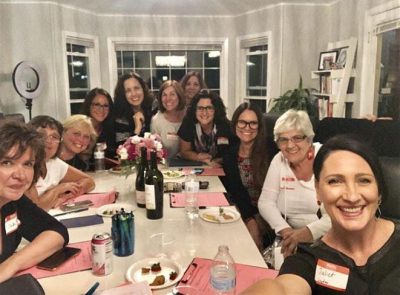An increase in the proportion of women in senior management roles in recent years left the percentage at 29 percent last year, where it has stayed stagnant since. This means the other 71 percent of positions are held by men, leaving many women absent from leadership positions.

Given this disparity, Boston real estate agent Juliet Leydon decided it was time for a change.
After networking with other women in business for years, Leydon said she was “burnt out” from having the same formulaic conversations and interactions. Her solution, instead of quitting the networking process, was to create her own way for women to collaborate.
The Women Leaders Gathering, which started in 2018, brings together women in business each month to connect and share what they’ve accomplished since the prior meeting and set goals for the following month.
Leydon said she was inspired by bad experiences in the networking circuit and her desire to build a community where there wasn’t an agenda or routine.
The point of the group, Leydon said, is not for women to introduce themselves to other women, but rather to celebrate what they have achieved and wish to achieve in the future.
“I think we get trained to develop your elevator pitch, and that’s just not what I wanted to incorporate,” Leydon said. “While that’s important, they strike me as schmaltzy and salesy, and that wasn’t the point of the group.”
The past few months have posed a challenge for the Women Leaders Gathering because of the pandemic.
“We haven’t really been meeting,” Leydon said. “I’ve only done one Zoom call, because I’m struggling with how to reintroduce it, just because I feel like everyone has Zoom burnout.”
For the future, Leydon hopes to continue the Women Leaders Gathering, but to make it COVID-19-friendly by keeping women socially distanced when meeting in person.
While Leydon does not yet have concrete plans on when the group will meet in the future, she said she hopes they can get the group operating again due to the positive impacts it has on motivating women to achieve their goals.
“[I’d like] to get back into the accountability,” Leydon said, “where we can hold each other accountable in those monthly goals.”
For upcoming meetings, Leydon said she wants to plan events where more women can come together to make meaningful connections, even though those events may be far in the future.
Susan Samuelson, a professor emeritus in Boston University’s Questrom School of Business, has published textbooks in which she writes that women are vital in business.
In an interview, Samuelson shared one of these comments about how companies are more successful when there are more women in positions of power.
“Women leaders are important in business, because research suggests that businesses with more women board members have higher earnings, stock prices, return on equity, profitability, stakeholder responsiveness and fewer scandals,” Sameulson said, reading from one of her textbooks.
Roberta Clarke, an associate professor emeritus at Questrom, said she attended Harvard Business School when her class was only 3 percent female, which affected her outlook on women in business.
“I was used to putting up with a lot of crap,” Clarke said.
Because of her educational background, Clarke said, it’s vital for companies to consider women in the hiring process to avoid such imbalances.
“The concept of cutting your pool of candidates in half, even unwillingly,” Clarke said, “speaks poorly of those people and organizations who are selecting a leader.”
When it comes to women in the workforce, Leydon said she likes to focus on the small accomplishments in women’s lives, and forming a platform to support such women has been gratifying for her.
“That’s what I do, I bring people together,” Leydon said, “and I think when people, especially women, come together, magic happens.”
















































































































